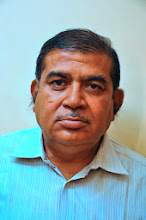with courtesy to The Statesman.........
KOLKATA, 28 NOV: "If the price of freedom is eternal vigilance, the price of democracy is an unfettered media, and we have to value it, despite its drawbacks and discomfort." That was the sense of former Indian foreign secretary Mr Krishnan Srinivasan's keynote address on the first day of an Editors' Conclave organised by the CR Irani Foundation in association with Konrad Adeneur Stiftung (KAS) here today. The topic for discussion was provocative: "Manufactured by the Media?"
The conclave was inaugurated by the Editor of The Statesman, Mr Ravindra Kumar. In her opening remarks, Mrs Beatrice Gorawantschy, resident representative of KAS, elaborated on the media-related programmes run by her organisation in Asia.
Mr Srinivasan's speech, in fact, used as its point of departure the remarks of Ms Neelam Kapoor, principal director-general of Media and Communications, Government of India, at the welcome dinner last night when she said that the government is now more confident and keen to interact with the media. He felt that the Central and state governments in India were still far too reticent in the sharing of information, especially when compared with Western their counterparts.
The morning session, moderated by Mr Manash Ghosh, Editor, Dainik Statesman, focused on the media's coverage of Sino-Indian relations. He said that the government has always denied incidents of Chinese intrusions which the media has reported and often or stonewalled queries on the issue. Senior journalist Mr Raju Santhanam, Managing Editor of NewsWatch Asia, said that even though the media may have got it wrong on occasion, without it governments wouldn't even take notice of many an incident. Mr Abhijit Bhattacharya, alumnus of the National Defence College, said for most people "seeing is believing", which is why the onus is on the media to be more responsible. Mr NK Singh, Political Editor, ETV, and general secretary of the Broadcast Editors’ Association, pointed out that gung-ho or inaccurate reportage on a sensitive and serious issue such as Sino-India relations has the potential to jeopardise diplomatic relations between the two nations.
Ms Tongam Rina, Associate Editor, Arunachal Times, said the media should focus on development of the border-states and not sensationalise intrusions which are commonplace and don't really effect local residents. Agreeing with the sentiment, Ms Patricia Mukhim, Editor-in-Chief, Shillong Times, said authentic reportage becomes a problem when it is difficult to access information due to lack of facilities.
All the panelists were, however, unanimous in the view that despite aberrations the media is by and large responsible and instances of distortion of news are the exceptions not the norm.
The afternoon session began the discussants analysng whether the media is "structured to lie." under pressure from both the private sector and the government. The session was moderated by Mr Sam Rajappa, Director, The Statesman Print Journalism School. Mr Pradip Phanjoubam, Editor of the Imphal Free Press, intervened to make the point: "Sometimes, it is necessary to take a subjective view, get involved in the situation, and take a moral stand. It's not always enough to be an 'objective' observer." Mr Sidharth Bhatia, Political Editor, DNA (Mumbai) seconded the sentiment, but added that it's not always easy to take such a stand given media dependence on advertisement revenue for sustenance. Mr G Babu Jayakumar, Metro Editor, The New Indian Express, Chennai, put it differently: "Often, the media speaks half-truths. And that, is when we lie."
Mr Hari Ram Pandey , Editor, Sanmarg, said that media needed to introspect on ethics while Mr Srinjoy Chaudhuri, Senior Editor, Times Now, said a good reporter should always have proof in hand before publishing or broadcasting a story to ensure authenticity and credibility. At the same time, Mr Srinivasan said, the very idea of censorship was "dangerous" while Ms Mukhim added: "The government holds back information, and the media's job is to get it. If we destroy Press freedom, we destroy the consensus of the people." Inputs by SPJS students.
Tuesday, December 1, 2009
Editors dissect the ‘manufacture’ of news
Posted by pandeyhariram at 1:03 AM
Subscribe to:
Post Comments (Atom)


2 comments:
nice reporting.
Response to Navadwip scsmath jamala: http://www.blip.tv/file/4055018/ at: "Paramahamsa Maharaja with Gundas Attacked SCS Math Navadwip" http://www.blip.tv/file/4085521
Post a Comment